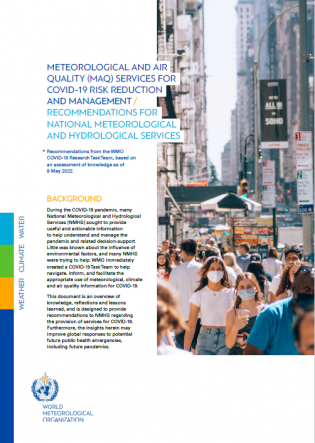World Meteorological Organization (WMO) SARS-CoV-2/COVID-19 Research Task Team has issue Meteorological and air quality (MAQ) services for COVID-19 risk reduction and management: recommendations for national meteorological and hydrological services on 22 June 2022 in Geneva. CCOUC Director Prof Emily Chan is a member of this international task team of 16 experts in earth, medical and public health sciences.
Lessons learned and experience gained about the interplay between Meteorological and Air Quality Factors and COVID-19 can serve as a blueprint for informing global responses to future public health emergencies and pandemics, the Task Team has concluded.
During the COVID-19 pandemic, many National Meteorological and Hydrological Services (NMHS) sought to provide useful and actionable information to help understand and manage the pandemic and related decision-support. Given that little was known about the influence of environmental factors on disease transmission, at the beginning of the pandemic WMO created an interdisciplinary and international COVID-19 Research Task Team on appropriate use of meteorological, climate and air quality information for COVID-19. The existing joint programming between the World Health Organization and WMO helped rapidly establish the collaboration between global meteorological and health experts.
The Research Task Team has now issued recommendations providing an overview of knowledge, reflections and lessons learned. It is designed to provide advice to NMHS regarding the provision of services for COVID-19, given that the WMO community can provide useful information to support the health sector during a pandemic, or localized outbreaks and public health emergencies.
It updates the current state of understanding of meteorological and air quality (MAQ) factors affecting SARS-COV-2 transmission and COVID-19 severity from the First Report of the WMO COVID-19 Task Team, in particular referring to questions about Seasonality, Air Quality and Compound Hazards.
The recommendations were issued during the annual session of WMO’s Executive Council, which has a focus on the strengthening of weather, climate, water and environmental services to serve the needs of society.
